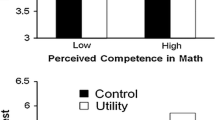Abstract
The empirical base of Trope's position on achievement-task choice is critiqued here. Attention is focused on Trope's earliest studies (Trope, 1975; Trope & Brickman, 1975) because they provide this position's most critical tests. Support for the following three propositions of the position is assessed: (1) diagnosticity information, rather than task difficulty information, is the basis of task selection; (2) desire for information about one's ability, not the wish for certain affective consequences, is what motivates achievement-task choice; and (3) the success of the Atkinson model is owed to the adventitious confounding existing between task diagnosticity and task difficulty, and the resulting confounding between ability-informational and affective consequences. The major findings are that (1) the tests of all propositions have such serious logical flaws that they cannot answer the questions they seek to answer, (2) the task choice situation containing the diagnosticity manipulation employed by Trope is so different from real-life task choice situations as to call into question the relevance of Trope's findings for the latter situations, (3) Trope's diagnosticity manipulation is a meaningless one as it gives rise to situations that are logical impossibilities (e.g., skill tasks that are performed equally well by high- and low-skilled people), and (4) the tests of Atkinson's position are invalidated by a serious misinterpretation of that position by Trope.
Similar content being viewed by others
References
Atkinson, J. W. (1957). Motivational determinants of risk-taking behavior.Psychological Review, 64 359–372.
Atkinson, J. W. (1964).An introduction to motivation. Princeton: Van Nostrand.
Atkinson, J. W., & Feather, N. T. (Eds.).A theory of achievement motivation. New York: Wiley.
Brody, N. (1980). Social motivation. In M. R. Rosenzweig & L. W. Porter (Eds.),Annual review of psychology (Vol. 31). Palo Alto: Annual Review.
Buckert, U., Meyer, W. U. & Schmalt, H. D. (1979). Effects of difficulty and diagnosticity on choice among tasks in relation to achievement motivation and perceived ability.Journal of Personality and Social Psychology, 37 1172–1178.
Kukla, A. (1978). An attributional theory of choice. In L. Berkowitz (Ed.),Advances in experimental social psychology (Vol. 11). New York: Academic Press.
McClelland, D. C., Atkinson, J. W., Clark, R. W., & Lowell, E. L. (1953).The achievement motive. New York: Appleton-Century-Crofts.
Schneider, K., & Posse, N. (1982). Risk taking in achievement-oriented situations: Do people really maximize affect or competence information?Motivation and Emotion, 6 259–271.
Trope, Y. (1975). Seeking information about one's ability as a determinant of choice among tasks.Journal of Personality and Social Psychology 32 1004–1013.
Trope, Y. (1979). Uncertainty-reducing properties of achievement tasks.Journal of Personality and Social Psychology, 37 1501–1518.
Trope, Y. (1980). Self-assessment, self-enhancement and task preference.Journal of Personality and Social Psychology, 16 116–129.
Trope, Y. (1982). Self-assessment and task performance.Journal of Experimental Social Psychology, 18 201–215.
Trope, Y., & Ben-Yair, E. (1982). Task construction and persistence as means for self-assessment of abilities.Journal of Personality and Social Psychology, 42 637–645.
Trope, Y., & Brickman, P. (1975). Difficulty and diagnosticity as determinants of choice among tasks.Journal of Personality and Social Psychology, 31 918–925.
Weiner, B. (1980).Human motivation. New York: Holt, Rinehart & Winston.
Weiner, B., Frieze, I., Kukla, A., Reed, L., Rest, S., & Rosenbaum, R. (1971). Perceiving the causes of success and failure. In E. Jones, D. Kanouse, H. Kelly, R. Nisbett, S. Valins, & B. Weiner (Eds.),Attribution: Perceiving the causes of behavior. New York: General Learning Press.
Weiner, B., & Kukla, A. (1970). An attributional analysis of achievement motivation.Journal of Personality and Social Psychology, 15 1–20.
Zuckerman, M., Brown, R. H., Fischler, G. H., Fox, G. A., Lathin, D. R., & Minesian, A. J. (1979). Determinants of information seeking behavior.Journal of Research in Personality, 13 161–174.
Author information
Authors and Affiliations
Rights and permissions
About this article
Cite this article
Sohn, D. The empirical base of Trope's position on achievement-task choice: A critique. Motiv Emot 8, 91–107 (1984). https://doi.org/10.1007/BF00993068
Issue Date:
DOI: https://doi.org/10.1007/BF00993068




